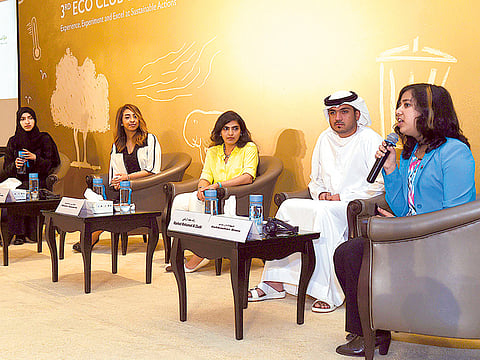Sustainable schools reduce water use
Eco clubs discuss their experiences in reducing environmental footprint

Abu Dhabi: Over the last two years, water consumption at Abu Dhabi emirate’s sustainable schools has decreased from 31 litres per person to 26.3 litres. At the same time, 87 per cent of the pupils at these institutions currently use shared transport, compared to 62 per cent at the start of 2013.
“It may seem like a small change, but it is especially significant because the change indicates a trend towards conservation. Saying that water consumption has decreased per person means that each person is now using less water than before, and these are the real actions that lead to long-term environmental sustainability,” Gayatri Raghwa, senior specialist for environmental outreach at the Environment Agency Abu Dhabi (EAD), told Gulf News.
She was speaking on the sidelines of the Eco Club Summit, which is seeing 240 pupils from 120 schools in the emirate gather to share their experiences about improving their schools’ environmental footprint.
The clubs are part of the Sustainable Schools Initiative, which was launched by the EAD in 2009 in its capacity as the emirate’s environment sector regulator.
At present, the initiative boasts participation by 150 public and private schools that work each year to monitor and improve their impact on the environment.
“When we launched the project in 2009, a handful of institutions used to recycle. Now, 82 per cent of all participating schools regularly recycle paper, plastic and metal waste. A number of them also recycle electronic waste [discarded electronic devices like phones and laptops],” Raghwa noted.
About half of the sustainable institutions also compost organic waste while 55.6 per cent of them use energy-efficient equipment.
“The greatest strides have been taken with regard to water use and conservation. In fact, 94 per cent of the participating schools have been able to reduce their water consumption, while 60 per cent of them reuse or recycle white or grey waste water,” Raghwa said.
Schools are also tasked with implementing actions that help conserve the environment, and many of these strategies and projects were discussed at the two-day Eco club summit.
Khalifa Saif, a Grade 12 pupil at Al Remah School, has been closely involved with a series of projects introduced by his school’s eco club. This year, the group is working to develop a smart farm that optimises water use, among other things.
“My father owns a farm in Abu Dhabi, and it will be my responsibility to take care of it one day. It is therefore also my responsibility to protect the environmental wealth of the UAE and the world,” he said.
“Last year, we found that the 550 farms in the stretch between Al Remah and Abu Samra use an average of 38,000 cubic metres of water each year. Our two smart farms, on the other hand, consume about 7,000 cubic metres by distributing the water to the plants that need it, and using sprinklers instead of a process of flooding to water the plants,” Saif added.
Reem Hassan, a pupil at Al Khatm School, said her school had worked to create awareness on how to protect farm plants from camels.
Sign up for the Daily Briefing
Get the latest news and updates straight to your inbox


